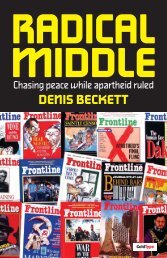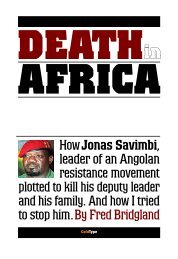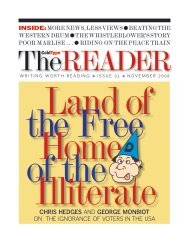UPDATED - ColdType
UPDATED - ColdType
UPDATED - ColdType
- TAGS
- updated
- coldtype
- coldtype.net
You also want an ePaper? Increase the reach of your titles
YUMPU automatically turns print PDFs into web optimized ePapers that Google loves.
the UN that the Iraqi armed forces, acting on his<br />
instructions, had destroyed the last of their<br />
banned munitions. But, whether Saddam Hussein<br />
is able to use such weapons or not, their<br />
deployment in Iraq appears to be imminent, for<br />
the Americans seem determined to do so.”<br />
Depleted uranium:<br />
Words we never hear<br />
EMBEDDED: WEAPONS OF MASS DECEPTION<br />
AMONG the weapons being used are anti-tank<br />
shells coated with depleted uranium. The US<br />
insists they are safe. Critics contest that. The LA<br />
Times, a winner of yesterday’s Pulitzer Prize,<br />
noted on March 30th:<br />
“Although the potential human cost of the war<br />
with Iraq is obvious, not many people are aware<br />
of a hidden risk that may haunt us for years.<br />
“Of the 504,047 eligible veterans of the 1991 Persian<br />
Gulf War, about 29% are now considered<br />
disabled by the Department of Veterans Affairs,<br />
the highest rate of disability for any modern war.<br />
And most are not disabled because of wounds.<br />
“These guys were rough, tough, buff 20-yearolds<br />
a decade ago. The vast majority is ill<br />
because of a complex of debilities known as the<br />
Gulf War Syndrome.<br />
“These vets were exposed to toxic material<br />
from both sides, including numerous chemicals,<br />
fumes, and weird experimental vaccines. But the<br />
largest number of the more than half a million<br />
troops eligible for VA benefits – 436,000 – lived for<br />
months in areas of the Middle Eastern desert that<br />
had been contaminated with depleted uranium.”<br />
“We kicked the crap out of them”<br />
TOMDISPATCH.COM writes on this issue, too: “It<br />
182<br />
is worth remembering that the army of 100,000plus<br />
young men and women who will occupy<br />
Iraq for who knows how long – and of course the<br />
Iraqis who have nowhere else to go – will all be<br />
putting their health on the line so that we can<br />
create a certain degree of greater target penetration<br />
with our weaponry. As the LA Times<br />
piece suggests, the famed epitaph for the Punic<br />
Wars might apply: “They made a desolation and<br />
called it Peace.”<br />
Our response? According to Col. James<br />
Naughton, director of munitions for the U.S.<br />
Army Material Command, as quoted in a recent<br />
Article in the Pittsburgh Post-Gazette: “The<br />
Iraqis tell us terrible things happened to our people<br />
because you used it last time . . . They want it<br />
to go away because we kicked the crap out of<br />
them – OK? There’s no doubt that DU gave us a<br />
huge advantage over their tanks.”<br />
You can check in,<br />
but you can’t check out<br />
SOME embeds want out, as Joe Strupp reports<br />
in Editor and Publisher: “At least 10 embedded<br />
journalists have left their assigned slots with U.S.<br />
military units in Iraq, according to a Pentagon<br />
spokesman, who said twice as many people have<br />
requested to leave but chose to stay after being<br />
told their news organizations would lose the<br />
slots for good if they departed. Meanwhile, the<br />
Pentagon says they ‘won’t change the rules that<br />
bar news organizations from replacing embeds<br />
who leave or switching them from one military<br />
unit to another.’<br />
“Col. Jay DeFrank, director of press operations<br />
for the Department of Defense, said he understood<br />
that some newspapers may need to move

















